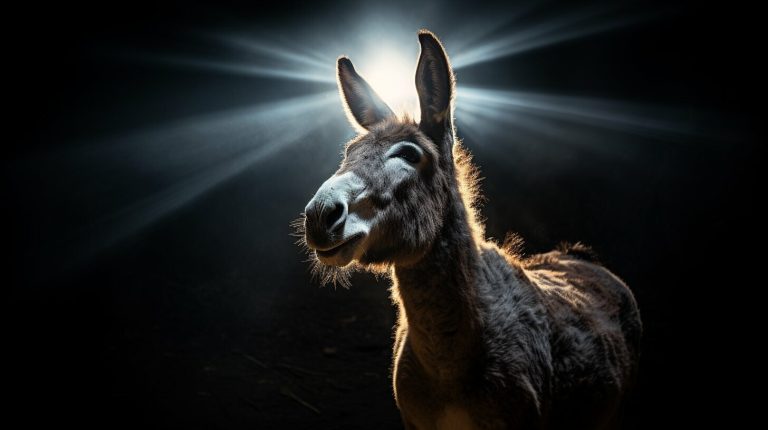Get a Kick Out of Why a Donkey is Called a Jackass!
Have you ever wondered why a donkey is called a jackass? Let’s dive into the amusing linguistic mystery behind this peculiar name.
Key Takeaways:
- The term “jackass” originated from the words “jack,” which meant commoners, and “ass,” derived from the Latin word “asinus,” meaning male donkey.
- The name “donkey” didn’t come into common usage until 1785.
- The insult “jackass” gained popularity when Massachusetts congressman Daniel Webster used it to refer to Kentucky congressman Henry Clay in the 1820s.
- President Andrew Jackson embraced the nickname “jackass” as a symbol of steadfastness and determination.
- Over time, “jackass” came to mean stupid or reckless.
- Cartoonist Thomas Nast popularized the use of donkey and jackass as symbols for the Democratic and Republican parties in the United States in the 1800s.
The Historical Significance of the Term Jackass
To understand why donkeys are called jackasses, we need to take a trip back in time to uncover the historical roots of this peculiar name. The term “jackass” has its origins in the words “jack” and “ass,” which individually referred to a male donkey.
The word “jack” was commonly used to denote a commoner or a man of the working class, while “ass” comes from the Latin word “asinus,” meaning donkey. Interestingly, the name “donkey” didn’t come into common usage until 1785, long after “jackass” had already established itself in the English language.
But it wasn’t until the 1820s that “jackass” took on a new meaning beyond just referring to a male donkey. It was during this time that Massachusetts congressman Daniel Webster infamously called Kentucky congressman Henry Clay a jackass. President Andrew Jackson, known for his steadfastness and determination, embraced the nickname and the image of the jackass as a symbol of his own character.
From then on, “jackass” started to be used as an insult, implying stupidity or recklessness. This evolution of the term from a simple reference to a male donkey to an insult reflected the changing political landscape and the use of animal symbolism in political discourse.
| Historical Facts | |
|---|---|
| The term “jackass” originated from the words “jack” and “ass,” meaning male donkey. | Historical Roots of the Term Jackass |
| The name “donkey” didn’t come into common usage until 1785. | |
| President Andrew Jackson embraced the nickname “jackass” as a symbol of his own character. | |
| “Jackass” evolved from a simple reference to a male donkey to an insult meaning stupidity or recklessness. |
From Politicians to Symbolic Mascots: Jackass Takes on a New Meaning
The term “jackass” took on a whole new meaning as it transformed from a simple reference to male donkeys to a symbol associated with foolishness and political commentary. The use of “jackass” as an insult can be traced back to politicians, where it found a home in the realm of political discourse. In the 1820s, Massachusetts congressman Daniel Webster called Kentucky congressman Henry Clay a jackass, sparking a feud that would forever change the connotation of the word.
In a surprising turn of events, President Andrew Jackson, who was often portrayed as a strong-willed and determined leader, embraced the nickname “jackass” given to him by his opponents. He saw it as a symbol of his unwavering resolve and used it to his advantage. Jackson’s endorsement of the term, along with his association with the Democratic Party, solidified the connection between donkeys, jackasses, and politics.
Fast forward to the 1800s, and cartoonist Thomas Nast introduced donkeys and elephants as symbols for the Democratic and Republican parties, respectively. Nast’s political cartoons depicted the parties as stubborn and headstrong animals, further perpetuating the connection between donkeys and jackasses in the context of American politics. These iconic symbols are still widely recognized and used today.
| Donkeys | Jackasses |
|---|---|
| Represent the Democratic Party | Synonymous with foolishness and recklessness |
| Associated with determination and persistence | Used as a political insult |
| Carry historical significance | Symbolize political commentary |
So, the next time you hear the term “jackass,” remember its journey from being a simple name for a male donkey to becoming a symbol of political banter and foolishness. Donkeys and jackasses have taken on multiple meanings throughout history, leaving an intriguing trail of etymology and cultural significance.
The Democrat-Republican Donkey-Jackass Connection
Did you know that donkeys and jackasses have been adopted as symbols for political parties? Let’s uncover the intriguing story behind their connection to the Democrats and Republicans.
The association between donkeys and the Democratic Party can be traced back to the 1800s when political cartoonist Thomas Nast popularized the image of a donkey in his illustrations. In one particular cartoon published in Harper’s Weekly in 1870, Nast used the donkey as a symbol for the Democratic Party. The cartoon depicted a donkey wearing a lion’s skin, symbolizing the Democrats’ attempt to disguise their true nature. This portrayal stuck and soon the donkey became the unofficial emblem of the party.
On the other hand, the Republican Party’s connection to the jackass is less straightforward. While the Democrats embraced the donkey as a symbol, the Republicans did not initially adopt the jackass as their official emblem. However, the term “jackass” was used to refer to the Republican Party in a derogatory manner by their opponents. This association gained further traction when President Andrew Jackson, a Democrat, was nicknamed “Old Hickory” or “Jackass” due to his unwavering determination. The Republican Party eventually embraced the nickname as a symbol of their own steadfastness and defiance against their critics.
Today, the donkey and jackass remain enduring symbols for the Democratic and Republican parties respectively. Whether you see them as animals of burden or symbols of resilience, the donkey and jackass continue to reflect the unique characteristics and ideologies of these political groups.
| Party Symbol | Significance |
|---|---|
| Donkey | Affectionately adopted by the Democrats in the 1800s, symbolizing their determination and perseverance. |
| Jackass | Initially used derogatorily towards the Republicans, they eventually embraced it as a symbol of their defiance and resilience. |
Conclusion
As we conclude our journey into the origin and meaning behind calling a donkey a jackass, we can now appreciate the historical significance and linguistic nuances that have shaped this peculiar name.
Historically, the words “jack” and “ass” were used to refer to male donkeys. The term “jack” was associated with commoners, while “ass” derived from the Latin word “asinus.” Interestingly, the name “donkey” only gained popularity in 1785.
The use of “jackass” as an insult can be traced back to politicians. It was in the 1820s when Massachusetts congressman Daniel Webster famously called Kentucky congressman Henry Clay a jackass. President Andrew Jackson, embracing the nickname, used it as a symbol of steadfastness and determination. Over time, “jackass” evolved to mean someone who is stupid or reckless.
Additionally, the association of donkeys and jackasses with the Democratic and Republican parties in the United States can be credited to the renowned cartoonist Thomas Nast in the 1800s. Through his political cartoons, Nast popularized the use of these animals as symbols for the two major parties.
So, the next time someone asks why a donkey is called a jackass, you can impress them with your newfound knowledge. The term’s origins lie in the historical naming of male donkeys, and its evolution into an insult and political symbol adds an intriguing layer to its meaning.
FAQ
Why is a donkey called a jackass?
Donkeys are called jackasses because historically, the words “jack” and “ass” meant male donkey. The term “jack” was used to refer to commoners, while “ass” comes from the Latin word “asinus.”
What is the difference between a donkey and a jackass?
Donkey is the common term used to refer to the animal, while jackass specifically refers to a male donkey.
What is the historical significance of the term jackass?
The term “jackass” has a rich historical context. It has evolved from simply meaning a male donkey to becoming a symbol of stupidity or recklessness.
How did jackass become associated with politics?
The connection between jackass and politics can be traced back to the 1820s when Massachusetts congressman Daniel Webster called Kentucky congressman Henry Clay a jackass. President Andrew Jackson embraced the nickname, and it eventually became symbolic of steadfastness and determination.
Why are donkeys and jackasses used as symbols for the Democratic and Republican parties?
The use of donkey and jackass as symbols for the Democratic and Republican parties in the United States can be attributed to cartoonist Thomas Nast in the 1800s. He popularized the association through his political cartoons.
What is the difference between calling a donkey a jackass and why is a donkey called a jackass?
Calling a donkey a jackass is based on its historical association with the term. Donkey is the more common and neutral term used to refer to the animal.
- Discovering Why Do Women Wear Lipstick: A Deeper Look - 19/12/2023
- Why Do Golfers Only Wear One Glove? - 16/12/2023
- Why Don’t Hobbits Wear Shoes? - 14/12/2023
Hi, I’m Rhiannon, the lead author behind The News Wire. As a passionate journalist, I strive to bring you the latest news and updates from all over the world. With a keen eye for detail and a dedication to unbiased reporting, I aim to deliver well-researched and informative articles that keep you informed and engaged. From breaking news to in-depth analyses, I cover a wide range of topics with the aim of keeping you in the loop. Join me on The News Wire as we explore the dynamic and ever-changing landscapes of global events, uncovering the stories that matter most.






